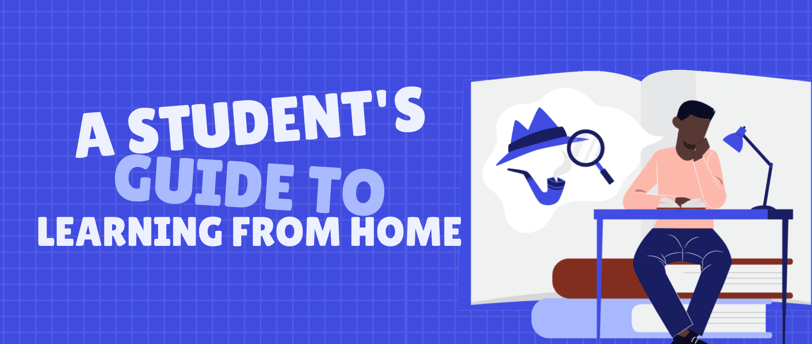A Student's Guide to Learning from Home | Study Tips & Tools
Master remote learning with this comprehensive guide for students. Discover practical tips on setting up your study space, staying motivated using digital tools, and thriving in a home learning environment.
LEARNING TIPS
Desta Edward
5/23/20254 min read


The digital age has brought education to our fingertips, making learning from home not only a possibility but a growing norm for students worldwide, Whether you're enrolled in an online university, attending virtual high school, or supplementing traditional education with remote learning resources, mastering the art of studying from home is key to your academic success.
This comprehensive guide is designed to help students of all levels optimise their home learning experience from creating an effective workspace to staying motivated & connected.
1. Setting Up Your Ideal Learning Space
One of the biggest advantages of learning from home is the flexibility it offers, but without a designated study area, it can be hard to focus. Here's how to create a productive learning environment.
Choose a Dedicated Space
Pick a quiet, well-lit area in your home where you can concentrate without distractions. Avoid studying in bed or on the couch, as these spaces are associated with relaxation and can negatively impact your focus.
Organise Your Tools
Ensure your study area has all the necessary materials: a laptop or desktop computer, notebooks, pens, textbooks, chargers, and any other supplies you regularly use.
Minimize Distractions
Turn off notifications on your phone or use apps like Forest or Focus@Will to help you stay on task. Let family members or roommates know your schedule to avoid interruptions.
2. Creating a Realistic Schedule
Without the structure of a traditional classroom, time management becomes crucial. A well-planned schedule helps you stay on track and prevents last-minute cramming.
Use a Planner or Digital Calendar
Write down all your deadlines, exam dates, and class times. Use tools like Google Calendar or Notion to block off study time and set reminders..
Break Tasks into Chunks
Follow the Pomodoro Technique or time-blocking methods to divide your study time into focused intervals with short breaks in between.
Prioritize Tasks
Start your day with the most important or challenging tasks. Use the Eisenhower Matrix to decide what needs urgent attention and what can be scheduled later.
3. Staying Engaged and Motivated
Maintaining motivation while learning remotely can be challenging, especially when distractions are everywhere.
Set Personal Goals
Define clear, achievable academic and personal goals. This could be anything from improving your GPA to reading a new book each month.
Reward Yourself
Treat yourself after completing a study session or finishing a difficult assignment, Small rewards can reinforce positive habits.
Stay Inspired
Listen to educational podcasts, follow inspiring educators on social media, or join online forums and study groups to stay connected to the academic community.
4. Mastering Online Learning Tools
Familiarity with digital tools can enhance your learning experience, from communication platforms to research tools, and make the most of what the internet has to offer.
Video Conferencing Apps
Get comfortable using Zoom, Microsoft Teams, or Google Meet. Learn how to share screens, mute/unmute yourself, and use breakout rooms effectively.
Cloud Storage and Collaboration
Use Google Drive or Dropbox for file storage and sharing. Tools like Google Docs and Trello allow seamless collaboration with classmates.
Learning Management Systems (LMS)
Get familiar with your school’s LMS, such as Canvas, Blackboard or Moodle, these platforms host course materials, quizzes, assignments and forums.
5. Building a Support System
Isolation is a common challenge for remote learners. Cultivating a strong support network can help you feel connected and supported.
Communicate Regularly
Check in with teachers and classmates regularly, don’t hesitate to ask questions or request feedback.
Join Study Groups
Virtual study groups can help reinforce learning and keep you accountable. Use platforms like Discord, WhatsApp, or even Reddit to find or form a group.
Talk About Your Experience
Share your thoughts and struggles with family and friends; simply talking about your learning experience can reduce stress and provide a new perspective.
6. Taking Care of Your Mental and Physical Health
A healthy mind and body are essential for effective learning.
Maintain a Routine
Wake up, eat, and sleep at consistent times; a routine can help regulate your body clock and improve your overall mood.
Stay Active
Incorporate physical activity into your day. Even a short walk or a 10-minute home workout can boost your energy and focus.
Practice Mindfulness
Use meditation apps like Headspace or Calm, or simply take deep breaths and stretch periodically to stay grounded and reduce stress.
7. Evaluating and Adjusting Your Approach
Learning from home requires continuous adaptation. Regularly assess your habits and strategies to ensure they are working for you.
Reflect Weekly
At the end of each week, reflect on what went well and what didn’t. Adjust your schedule and methods accordingly.
Seek Feedback
Ask for feedback from instructors or peers. Constructive criticism can highlight areas for improvement you might not notice on your own.
Stay Flexible
Be open to trying new study techniques or technologies. What works for one person might not work for you, and that’s okay.
8. Leveraging Online Resources
The internet is full of so many valuable resources for students
Educational Platforms
Explore platforms like Coursera, Khan Academy, edX, and YouTube channels like CrashCourse for supplementary learning.
Productivity Apps
Tools like Evernote, Notion, Todoist, and Grammarly can help you stay organised and improve your academic work.
Libraries and Databases
Many institutions offer access to online libraries and journals; take advantage of these for research and reading.
Conclusion: Embrace the Opportunity
Learning from home is more than just a temporary solution, it’s a skill that can benefit you throughout life. It teaches discipline, adaptability, and independence, qualities that are invaluable in both academic and professional settings.
By creating a conducive learning environment, staying organised, and taking care of your well-being, you can make the most of your at-home education journey. Remember, the goal isn't perfection but progress. Stay curious, stay committed, and embrace the unique advantages that learning from home offers.
